Related Research Articles
A special economic zone (SEZ) is an area in which the business and trade laws are different from the rest of the country. SEZs are located within a country's national borders, and their aims include increasing trade balance, employment, increased investment, job creation and effective administration. To encourage businesses to set up in the zone, financial policies are introduced. These policies typically encompass investing, taxation, trading, quotas, customs and labour regulations. Additionally, companies may be offered tax holidays, where upon establishing themselves in a zone, they are granted a period of lower taxation.

This aims to be a complete article list of economics topics:
In economics, internationalization or internationalisation is the process of increasing involvement of enterprises in international markets, although there is no agreed definition of internationalization. Internationalization is a crucial strategy not only for companies that seek horizontal integration globally but also for countries that addresses the sustainability of its development in different manufacturing as well as service sectors especially in higher education which is a very important context that needs internationalization to bridge the gap between different cultures and countries. There are several internationalization theories which try to explain why there are international activities.
This is a list of international trade topics.

A foreign direct investment (FDI) refers to purchase of an asset in another country, such that it gives direct control to the purchaser over the asset. In other words, it is an investment in the form of a controlling ownership in a business, in real estate or in productive assets such as factories in one country by an entity based in another country. It is thus distinguished from a foreign portfolio investment or foreign indirect investment by a notion of direct control.
The Balassa–Samuelson effect, also known as Harrod–Balassa–Samuelson effect, the Ricardo–Viner–Harrod–Balassa–Samuelson–Penn–Bhagwati effect, or productivity biased purchasing power parity (PPP) is the tendency for consumer prices to be systematically higher in more developed countries than in less developed countries. This observation about the systematic differences in consumer prices is called the "Penn effect". The Balassa–Samuelson hypothesis is the proposition that this can be explained by the greater variation in productivity between developed and less developed countries in the traded goods' sectors which in turn affects wages and prices in the non-tradable goods sectors.
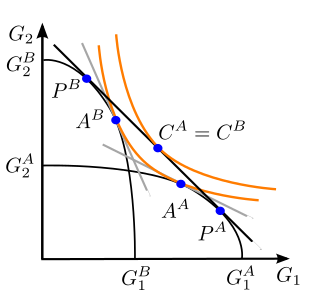
The Heckscher–Ohlin model is a general equilibrium mathematical model of international trade, developed by Eli Heckscher and Bertil Ohlin at the Stockholm School of Economics. It builds on David Ricardo's theory of comparative advantage by predicting patterns of commerce and production based on the resources of a trading region. The model essentially says that countries export the products which use their relatively abundant and cheap factors of production, and import the products which use the countries' relatively scarce factors.
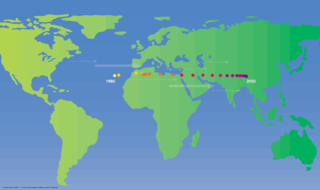
The gravity model of international trade in international economics is a model that, in its traditional form, predicts bilateral trade flows based on the economic sizes and distance between two units. Research shows that there is "overwhelming evidence that trade tends to fall with distance."
The Journal of Political Economy is a monthly peer-reviewed academic journal published by the University of Chicago Press. Established by James Laurence Laughlin in 1892, it covers both theoretical and empirical economics. In the past, the journal published quarterly from its introduction through 1905, ten issues per volume from 1906 through 1921, and bimonthly from 1922 through 2019. The editor-in-chief is Magne Mogstad.
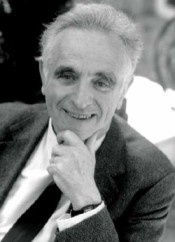
Paul Bairoch was a Swiss economic historian of Belgian descent who specialized in urban history and historical demography. He published or co-authored more than two dozen books and 120 scholarly articles. His most important works emphasize the agricultural preconditions necessary for industrialization and controversially claim, contrary to most scholars that colonization was not beneficial to colonial empires. He argued that tariffs and growth were positively correlated in the 19th century.
Maurice Kugler is a Colombian American economist born in 1967. He received his Ph.D. in economics from UC Berkeley in 2000, as well as an M.Sc. (Econ) and a B.Sc. (Econ) both from the London School of Economics. Kugler is professor of public policy in the Schar School of Policy and Government at George Mason University. Prior to this, he worked as a consultant for the World Bank, where he was senior economist before (2010-2012). Most recently he was principal research scientist and managing director at IMPAQ International.
Ricardo Jorge Caballero is a Chilean macroeconomist who is the Ford International Professor of Economics at the Massachusetts Institute of Technology. He also served as the Chairman of MIT's Economic Department from 2008 to 2011. He is a director of the World Economic Laboratory at MIT and an NBER Research Associate. Caballero received his PhD from MIT in 1988, and he taught at Columbia University before returning to the MIT faculty.

Terry Barker is a British economist and former Director of the Cambridge Centre for Climate Change Mitigation Research (4CMR) part of the Department of Land Economy, University of Cambridge. He is also a member of the Tyndall Centre, the Chairman of Cambridge Econometrics, and chairman of the Cambridge Trust for New Thinking in Economics, which is a charitable organisation with a mission to promote new approaches to solving economic problems.
An international investment agreement (IIA) is a type of treaty between countries that addresses issues relevant to cross-border investments, usually for the purpose of protection, promotion and liberalization of such investments. Most IIAs cover foreign direct investment (FDI) and portfolio investment, but some exclude the latter. Countries concluding IIAs commit themselves to adhere to specific standards on the treatment of foreign investments within their territory. IIAs further define procedures for the resolution of disputes should these commitments not be met. The most common types of IIAs are bilateral investment treaties (BITs) and preferential trade and investment agreements (PTIAs). International taxation agreements and double taxation treaties (DTTs) are also considered IIAs, as taxation commonly has an important impact on foreign investment.
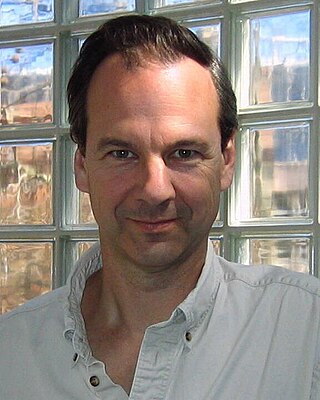
Michael Patrick Keane is an American-born economist; he is the Wm. Polk Carey Distinguished Professor at Johns Hopkins University. Keane was previously a professor at the University of New South Wales and the Nuffield Professor of Economics at the University of Oxford. He is considered one of the world's leading experts in the fields of Choice Modelling, structural modelling, simulation estimation, and panel data econometrics.
Holger Görg is a German economist who currently works as Professor of International Economics at the University of Kiel. Görg also leads the Kiel Center for Globalization and heads the Research Area "Global Division of Labour" at the Kiel Institute for the World Economy. In 2009, he was awarded the Gossen Prize for his contributions to the study of firms' decisions to invest, export and outsource parts of their value chains abroad.
Thierry Mayer is a French economist and Professor of Economics at Sciences Po. He belongs to the most frequently-cited economists in the field of international trade. In 2006, Mayer and Etienne Wasmer were awarded the Best Young Economist of France Award by Cercle des économistes and Le Monde.
Robert Christopher Feenstra is an American economist, academic and author. He is the C. Bryan Cameron Distinguished Chair in International Economics at University of California, Davis. He served as the director of the International Trade and Investment Program at the National Bureau of Economic Research from 1992 to 2016. He also served as Associate Dean in the Social Sciences at the University of California, Davis from 2014 to 2019.
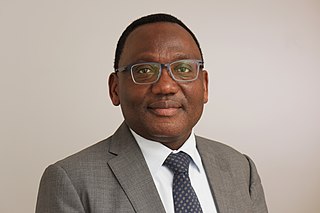
Awudu Abdulai is a Ghanaian agricultural and development economist, and professor at the Institute of Food Economics and Consumption Studies, University of Kiel, Germany. His research and teaching focus on issues related to poverty alleviation, food and nutrition security, consumer behavior, and sustainable agriculture.
James R. Markusen is an American economist, academic, and author. He is Distinguished Professor (emeritus) at the University of Colorado, Boulder.
References
- 1 2 3 4 5 6 Peter Egger, ETH Zurich website. Retrieved 28 January 2025.
- ↑ Curriculum vitae of Peter Egger. Retrieved 30 April 2018.
- ↑ List of Gossen Prize winners . Retrieved 30 April 2018.
- ↑ Ranking of economists registered on IDEAS/RePEc. Retrieved April 30th, 2018.